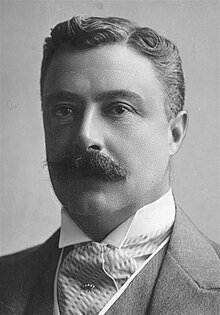
Back ويليام وارد (الحاكم العام لاستراليا من المملكه المتحده) ARZ William Humble Ward, 2. hrabě Dudley Czech William Ward, 2. Earl of Dudley German William Ward (2e comte de Dudley) French ויליאם וורד, ארל דדלי השני HE विलियम हम्बल वार्ड, डड्ली के दूसरे अर्ल Hindi William Ward, II conte di Dudley Italian William Ward Polish Уорд, Уильям, 2-й граф Дадли Russian William Ward, 2nd Earl of Dudley SIMPLE
The Earl of Dudley | |
|---|---|
 Ward c. 1900s | |
| 4th Governor-General of Australia | |
| In office 9 September 1908 – 31 July 1911 | |
| Monarchs | Edward VII George V |
| Prime Minister | Alfred Deakin Andrew Fisher |
| Preceded by | Lord Northcote |
| Succeeded by | Lord Denman |
| Lord Lieutenant of Ireland | |
| In office 11 August 1902 – 11 December 1905 | |
| Monarch | Edward VII |
| Prime Minister | Arthur Balfour |
| Preceded by | Lord Cadogan |
| Succeeded by | Lord Aberdeen |
| Personal details | |
| Born | 25 May 1867 London, England |
| Died | 29 June 1932 (aged 65) London, England |
| Political party | Conservative |
| Spouses | |
| Children | 7 |
| Parent(s) | William Ward, 1st Earl of Dudley Georgina Moncrieff |
| Education | Eton College |
| Signature |  |
William Humble Ward, 2nd Earl of Dudley, GCB, GCMG, GCVO, TD, PC (25 May 1867 – 29 June 1932) was a British aristocrat, politician, and military officer who served as the fourth Governor-General of Australia, in office from 1908 to 1911. He was previously Lord Lieutenant of Ireland from 1902 to 1905, and also a government minister under Lord Salisbury.
Dudley was the son of William Ward, 1st Earl of Dudley, and succeeded to the earldom at the age of 17. He inherited a substantial fortune and the palatial family seat at Witley Court. Dudley sat with the Conservative Party in the House of Lords, and was Parliamentary Secretary to the Board of Trade from 1895 to 1902. He was appointed Lord Lieutenant of Ireland when Arthur Balfour came to power, and was regarded as a competent administrator. His time in Dublin led to his inclusion as a character in James Joyce's Ulysses.
In part due to the urging of King Edward VII, a longtime acquaintance, Dudley was appointed Governor-General of Australia in 1908. His extravagance and pomposity made him unpopular among the general public, and his attempts to interfere in political matters rankled both prime ministers he worked with (Andrew Fisher and Alfred Deakin). Deakin regarded him as doing "nothing really important, nothing thoroughly, nothing consistently [...] very ineffective and not very popular". He was recalled to England after less than three years in office.
Dudley took command of the Queen's Own Worcestershire Hussars in 1913. He had first joined the army as a young man, and during the Second Boer War served with the Imperial Yeomanry. In World War I, Dudley commanded the Hussars for the initial stages of the Gallipoli campaign, but he returned to England before its conclusion. He was later attached to the headquarters staff of the 40th Division, and retired with the rank of lieutenant-colonel. Dudley had seven children with his first wife, and was succeeded in the earldom by his oldest son William.